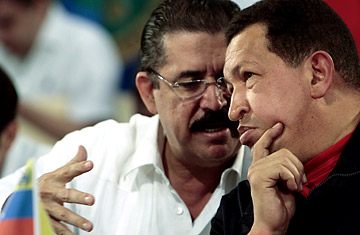
Ousted Honduran President Manuel Zelaya, left, talks to his Venezuelan counterpart, Hugo Chávez, during the Central-American integration meeting in Managua on June 29, 2009
Say this much for Roberto Micheletti: The Honduran coup leader, who refuses to let deposed President Manuel Zelaya back into the country, has at least turned Washington and Venezuelan President Hugo Chávez into diplomatic bedfellows. But can the Honduran crisis, as many are beginning to suggest, make acrimonious relations between the U.S. and Venezuela chummy again?
It's true that the ouster of Zelaya, who was flown into forced exile on June 28 by the Honduran military, has given Chávez and the Obama Administration some rare common ground. The world has denounced the coup as an affront to democratic norms and demanded that Zelaya be returned to office. The U.S. and Venezuela, which only last month returned their ambassadors to each other's capitals after pulling them out last year, agree that booting the democratically elected President out of his country at gunpoint in his pajamas was, as Chávez said, a "troglodyte" way of getting rid of the leader, even if Zelaya had flouted his own constitution.
Since then, the U.S., which needs Venezuela's oil, and Venezuela, which needs the U.S. oil market, have been on the same page, much to the rest of the hemisphere's surprise. U.S. Secretary of State Hillary Clinton has brought Zelaya and Micheletti into talks mediated by Costa Rican President Oscar Arias in hopes of finding a peaceful way to let Zelaya, a close Chávez ally, serve out the last half-year of his term. The left-wing and usually anti-U.S. Chávez has encouraged President Obama's involvement and even his leadership in restoring Zelaya to Tegucigalpa, the Honduran capital. "Obama," Chávez said last week, "do something."
Yet even that appeal was a not-so-veiled barb from Chávez. It was mild, admittedly, compared with the epithets he's thrown at Yanqui Presidents in the past, but it indicated the still narrow limits of U.S.-Venezuelan bonhomie. But Chávez is still going after the U.S. on his hours-long Sunday television show, Alo Presidente! (This week he repeated his claim that the CIA was somehow involved in the Honduran coup and warned Obama not to try to "trick us with ambiguous discourse or a smile.") And in Washington, even as she was aiding Zelaya's cause last week, Clinton sat down for an interview with Globovisión, an intensely anti-Chávez Venezuelan news network that backed a failed 2002 coup attempt against him. Asked about Chávez's recent threats to shut down Globovisión, Clinton said that suppressing opposition media is "not a way to run a democracy." That set off the Chávez government, which issued a statement calling Clinton's remarks "aggressive" and "disrespectful."
The Globovisión flap actually offers useful lessons in how the U.S. and Venezuela, the standard bearer of the Latin left, can bridge their Caribbean-size divide and help thaw the hemisphere's cold-war air. Clinton gave Globovisión an interview in no small part because the network has been on the receiving end of what it complains are the autocratic tactics of Chávez, who critics say has undermined Venezuela's democratic institutions even though he's been democratically elected three times since taking power a decade ago. This month his government is set to revoke the licenses of a massive swath of private radio and TV stations and is promoting a bill to criminalize material deemed "offensive" or "destabilizing" — code, say opponents, for anything critical of Chávez and his "21st century socialism." (Chavistas insist the licenses are being withdrawn for purely technical reasons and that the Venezuelan media are still free to criticize the government.)
Still, Clinton might have chosen a smarter channel for voicing those concerns. Globovisión's gratuitous anti-Chávez crusade is hardly a paragon of media professionalism. At a time when Clinton is condemning the Honduran coup, it rankles Chavistas that she'd promote a network that unabashedly backed a similar overthrow attempt seven years ago. Obama reached out to an often hostile Arab world by granting his first foreign media interview as President to al-Jazeera. Clinton's comments may have resonated in Venezuela and Latin America more effectively had she shared them with Telesur or other state-run Venezuelan TV.
Perhaps more important, the Globovisión feud points to how the U.S. and Venezuela can prod each other to better hemispheric images during the Honduran crisis. The "do something" remark was vintage Chávez, but it also reflected a growing concern in the hemisphere and beyond that Obama isn't exerting enough pressure on Micheletti, and therefore may not be as committed as he has declared to reversing Washington's long history of aiding military coups against leaders who aren't necessarily U.S allies. Likewise, Chávez needs to realize that his calls for Micheletti's regime to respect the democratic process in Honduras have thrown a brighter spotlight on the democratic process in Venezuela — and that Clinton's remarks, however "disrespectful," might be sound advice for any government.
At least Washington and Caracas are talking again. Diplomats say Venezuelan Foreign Minister Nicolás Maduro has made an effort to reach out to the Obama Administration. On the U.S. side, much of the credit goes to Thomas Shannon, outgoing Assistant Secretary of State for Western Hemisphere Affairs. Shannon, appointed in 2005, worked to alter President George W. Bush's dark first-term relations with Latin America, when Chávez called Bush "the devil" in large part because the White House had tacitly backed the 2002 coup attempt. As a result, the Latin left has less anti-Yanqui fodder to ignite. Shannon's nominated successor, Arturo Valenzuela, should have an easier time as a result. Still, even if the Honduran crisis has made them temporary allies, making U.S.-Venezuela relations permanently chévere — or swell — will be one of Valenzuela's toughest tasks.
